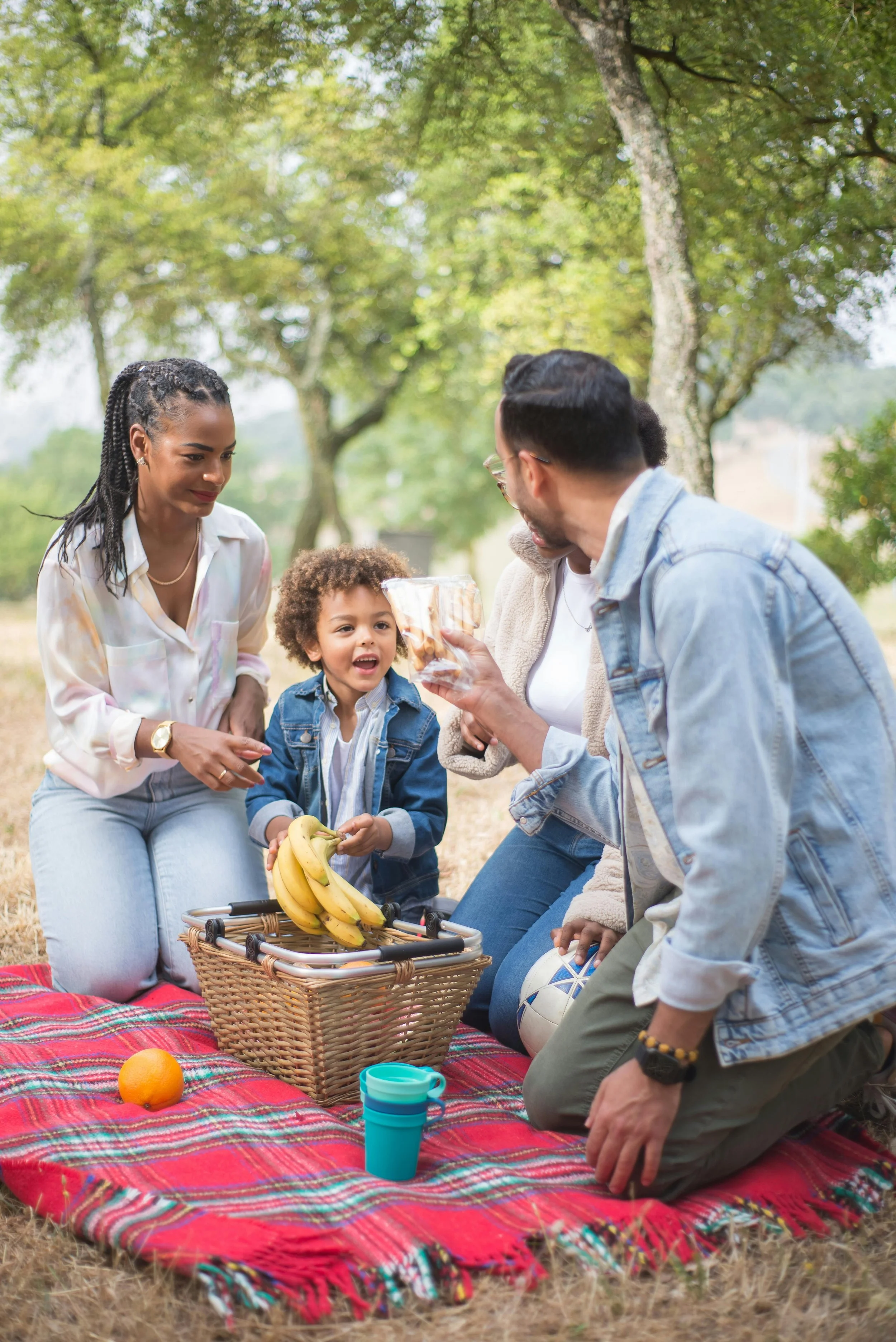The Healing Power of Family Picnics for Bonding
In the midst of busy schedules and daily stress, it’s easy to overlook the healing power of something as simple as a family picnic. But these small, shared moments—gathered around a blanket with food, laughter, and fresh air—can create space for connection, safety, and joy. For foster, adoptive, and kinship families, where relationships are often built through unique journeys, these relaxed outings can be a gentle and powerful way to deepen bonds and nurture healing.
Why Picnics Work for Healing and Bonding
Encourages Connection
Family picnics create a setting that naturally encourages connection. Away from the distractions of technology and the stressors of daily routines, a picnic offers an opportunity to simply be present with one another. When families gather outdoors to share a meal and enjoy each other’s company, they’re engaging in a form of intentional togetherness that fosters emotional closeness. This matters deeply for families who are still learning how to feel safe with one another or navigating the early stages of forming attachment bonds.
Nature
Nature itself plays a significant role in the healing process. Studies show that time spent in natural settings can reduce anxiety, lower stress hormones, and improve mood. For children and caregivers alike, the fresh air, open skies, and greenery create a sense of calm that supports emotional regulation. This relaxed environment is especially beneficial for families working through trauma or transitions, offering a non-clinical space where healing can unfold more organically.
More Relaxed
Picnics also remove many of the pressures that come with formal or structured family time. There’s no need for a long agenda or perfectly planned activities—just the freedom to eat, play, and talk in a casual, judgment-free space. This kind of low-stress environment is ideal for children who may feel overwhelmed by expectations or overstimulated by new environments. The informality makes room for authentic expression, spontaneous laughter, and quiet moments of connection that might not happen otherwise.
Shared Meals
Perhaps most importantly, shared meals are powerful in building a sense of belonging. Sitting together and eating—no matter how simple the food—is a universal act of care and community. For children who have experienced disrupted attachment or instability, even a picnic meal can send the message: You’re part of this family. You matter. You are safe here. In these small but meaningful ways, picnics help stitch together the emotional fabric that holds families close.
The Unique Impact on Foster, Adoptive, and Kinship Families
For foster, adoptive, and kinship families, bonding often requires more intentional effort and patience. Unlike traditional family structures, where attachment typically forms over time through daily routines and shared history, these families are navigating the process of building trust with children who may carry complex emotional experiences. In this context, a family picnic is more than just a fun outing—it becomes a gentle invitation to connect without pressure or expectation.
The unstructured nature of picnics offers children a chance to explore relationship-building in a safe, low-stakes setting. Without the need for deep conversations or scheduled activities, children are free to engage at their own comfort level. This autonomy can be empowering, especially for kids who have had limited control over their environment in the past. Whether it’s choosing a game to play, picking their favorite snack, or simply lying on the grass watching clouds, these small decisions can foster a sense of security and belonging.
For caregivers, picnics create opportunities to meet their children where they are emotionally. Many foster and adoptive parents are attuned to the ways trauma shows up in behavior—hypervigilance, withdrawal, testing boundaries—and a picnic allows for responsive parenting in a more relaxed, less reactive atmosphere. If a child becomes overwhelmed or needs space, there’s room—both literally and emotionally—to accommodate that need without derailing the entire experience.
These outings also allow all members of the family to relate to one another in new ways. Siblings by birth and by circumstance can bond over shared activities, laughter, and discovery. Moments like passing a soccer ball, chasing a butterfly, or working together to build a sandwich may seem small, but they offer meaningful chances to connect in ways that aren’t always possible in the structure of everyday life. These experiences contribute to the overall sense of being a “real” family—something children from disrupted backgrounds often long for.
Furthermore, family picnics give caregivers a chance to model relational repair and resilience. If a disagreement or emotional outburst arises, being in a calm and open space can help everyone navigate it with greater grace. Caregivers who respond with consistency, empathy, and calm presence during a picnic model something powerful: that connection doesn’t break under stress—it bends and rebounds. These subtle, lived-out lessons are what help children start to rewrite their internal narratives about trust, safety, and love.
In all of these ways, picnics are more than just a day in the sun. For foster, adoptive, and kinship families, they are a space where healing unfolds naturally, where relationships grow in the soil of patience and joy, and where the journey of becoming a family continues—one shared blanket and sandwich at a time.
Making the Most of Your Picnic Time
Planning a family picnic doesn’t need to be complicated to be meaningful. In fact, the most impactful experiences often come from keeping things simple and focused on connection.
1. Comfortable Location
Choose a location that feels comfortable for your family—whether that’s a neighborhood park, a quiet beach, or even your own backyard. What matters most is the space to be together without distraction. For some families, even laying a blanket on the living room floor and calling it a “picnic” can be just as effective.
2. Food
Food is often the heart of a picnic, and involving children in the planning can enhance the bonding experience. Let them choose their favorite snacks or help prepare sandwiches. This not only makes them feel included but also gives them a small sense of control—something especially valuable for children who have experienced disruption or loss. Even preparing a picnic the night before can be a fun activity that builds anticipation and gives your family something to look forward to.
3. Play and Creativity
Adding play and creativity can elevate the experience, but there’s no need to overthink it. Bring along a frisbee, bubbles, coloring supplies, or a simple board game. Encourage imaginative play—building forts with picnic blankets or telling group stories can foster collaboration and laughter. These activities help children express themselves freely, explore teamwork, and engage with caregivers in ways that strengthen their emotional connection.
4. Comfort Items
For children who are easily overwhelmed or have sensory sensitivities, it’s helpful to bring comfort items like a favorite stuffed animal, weighted blanket, or noise-canceling headphones. These small additions can help kids feel grounded and safe in an unfamiliar setting. If your family has multiple children with varying needs, setting up “quiet corners” or activity zones can give everyone the space they need to participate at their own pace.
5. Flexible Expectations
Lastly, be flexible with expectations. The goal of a family picnic isn’t perfection—it’s presence. There may be spilled drinks, distracted kids, or moments of frustration. That’s okay. Each outing is a chance to build connection, even in the messy, imperfect moments. By showing up with openness, patience, and a spirit of play, you send a powerful message to your children: this family makes space for everyone, exactly as they are.
Encouragement for Families
If your family is still in the process of learning how to connect, communicate, or simply be at ease together, know that you are not alone, and you are doing better than you think. Building trust and emotional safety takes time, especially in foster, adoptive, and kinship families where every member brings a unique story, background, and need. It’s okay if things don’t always go smoothly. What matters most is your willingness to show up, try again, and create opportunities for togetherness.
Family picnics may seem small, but they carry the potential to do something extraordinary: to create shared memories rooted in calm, joy, and belonging. These moments help children see their caregivers as safe, consistent, and present—not just during serious conversations or therapy sessions, but in the simple joys of everyday life. And for caregivers, they’re a reminder that healing doesn’t always happen in grand gestures—it often happens during a laugh, a shared snack, or a quiet walk after lunch.
Give yourself permission to start small. A thirty-minute picnic in your backyard or local park counts. A picnic with store-bought snacks and paper plates still counts. What matters is the intention behind it: creating space for connection, without pressure or perfection. These are the moments where trust can take root, and where children can start to believe in the promise of family again.
No matter where you are on your journey, remember that healing is possible—and it often begins in the quiet, ordinary spaces where love is offered freely. You don’t have to have it all figured out. You just have to keep showing up, one picnic at a time.
Conclusion
Family picnics may seem like simple outings, but for foster, adoptive, and kinship families, they hold the power to create healing spaces where connection can grow. Through shared meals, laughter, and unhurried time together, these moments remind everyone what it means to feel safe, seen, and supported. Whether in a park, a backyard, or your own living room, each picnic is a step toward deeper bonds—and a beautiful reminder that love is often found in the simplest of moments.
Here at Expressions of Hope, we are determined to provide care and resources to foster/adoptive families in need. If you have any questions or wish to get in touch with someone from our dedicated team, please do not hesitate to contact us.

